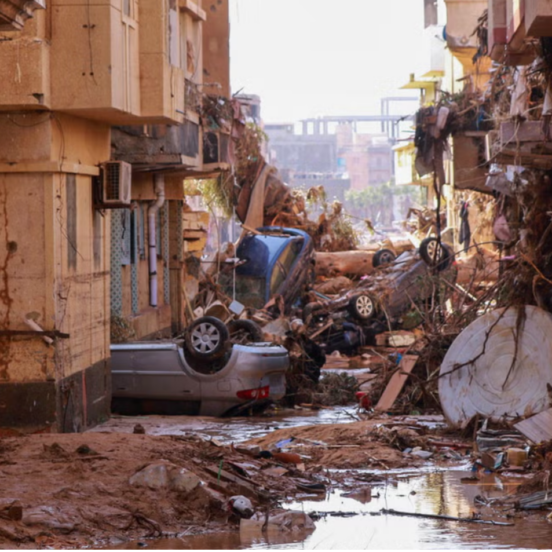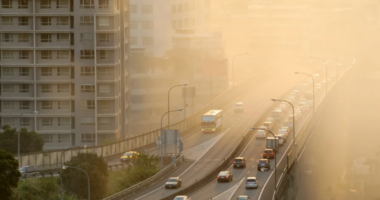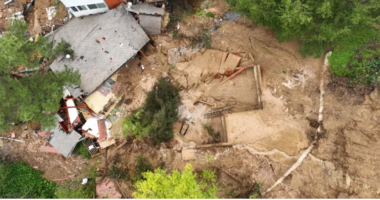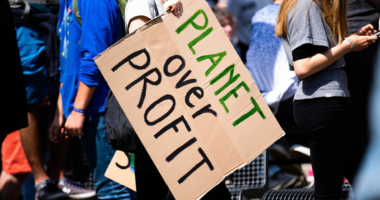Climate, Health and Equity Brief
Climate Week NYC, catastrophic flooding and a hefty price tag
September 25, 2023

The Climate, Health & Equity Brief is GMMB’s take on the last two weeks’ news on the current impacts of climate change. If you haven’t subscribed yet, you can do so by clicking here.
Hot Topic: On the brink. As world leaders and activists gathered this week in New York City to spotlight the climate crisis and discuss progress to mitigate its impacts, the world’s most vulnerable communities continue to reel from devastating losses caused by extreme weather.
Torrential downpours caused epic devastation in Libya, where nearly 4,000 are confirmed dead, 43,000 people have been displaced and 9,000 people remain missing. Muddy, fast-moving floodwaters swept away entire neighborhoods, destroyed thousands of homes and businesses, sank countless vehicles and made immediate rescue efforts nearly impossible. Meanwhile, findings from a new study revealed that human-caused climate change is making extreme flooding 50 times more likely to occur.
Fears of such climate devastation have spurred nine small island nations to pursue legal action, petitioning the International Tribunal for the Law of the Sea to apply UN ocean pollution laws to CO2 emissions and noting that some islands will be completely submerged by 2050 if warming continues unabated. A decision, which is expected to have global repercussions, is expected in 2024.
On the home front, a record 23 extreme weather events costing more than $1 billion each have taken place so far in 2023—with a total price tag estimated at $57.6 billion—prompting the Federal Emergency Management Agency (FEMA) to request an additional $16 billion in emergency funding to restock the depleted Disaster Relief Fund.
And the impacts of extreme weather are continuing to reshape the American housing market. A new study revealed that roughly 83% of potential home buyers now consider climate risks when shopping for homes, though many say they won’t actually move to areas with fewer climate risks, in large part due to affordability. And a separate study found that one-fourth of U.S. homes now face skyrocketing insurance premiums or are having their coverage completely revoked due to climate risks, making their homes much harder to afford—and very difficult to sell.
With a new study in Science Advances finding that six out of nine environmental indicators are now outside “safe operating boundaries for humanity” and commitments from the world’s biggest polluters lacking at Climate Week, action to turn the tide at COP28 in December has never been more necessary—or urgent.
Human Health
According to official figures released this week, nearly 4,000 people have died, 43,000 have been displaced, and an estimated 10,000 are still missing due to epic flooding in Libya, and new research found that human-caused climate change has made such floods 50 times more likely. (France24, USA Today)
A University of Michigan study found that higher levels of PM2.5 pollution—microscopic particles that can embed deeply in the lungs—are linked to increased rates of dementia, with the correlation especially strong with wildfire and agriculture-related pollution. (Inside Climate News)
Planetary Health
According to a study in Science Advances, Earth has surpassed the “safe operating space for humanity” in six out of nine crucial environmental indicators, with the current state of the climate, biodiversity, land, freshwater, nutrient pollution, and “novel” chemicals all posing a grave threat to the planet. (AP)
According to the National Oceanic and Atmospheric Administration (NOAA), the U.S. has experienced a record 23 extreme weather events that cost $1 billion or more each so far this year, with total costs exceeding $57.6 billion. (AP News)
The glaciers in Washington State’s Mount Rainier—historically referred to as “Forever Glaciers”—have shrunk more than 42% since 1896 due to rising global temperatures, impacting the mountain’s broader ecosystem and posing long-term challenges for the region. (The New York Times)
Summer wildfires across Canada, some of which are still active, have burned a total area larger than Bangladesh and released 410 million metric tons of carbon dioxide into the atmosphere. (Bloomberg)
Equity
Nine small island nations threatened by rising sea levels are turning to international law to compel countries to reduce the emissions that are causing their islands to sink, potentially setting a precedent for treating CO2 emissions as a form of pollution under UN law. (Bloomberg)
Politics & Economy
With U.N. Climate Week underway, The U.S. and the European Union are promoting clean energy and activists and environmentalists are urging leaders to crack down on fossil fuel use, and some countries issued new commitments—but none have come from the world’s biggest atmospheric polluters. (POLITICO)
Ahead of New York’s Climate Week, 75,000 people attended the March to End Fossil Fuels, calling on President Biden to stop federal approvals for new fossil fuel projects, phase out fossil fuels on public lands and water, and declare a climate emergency. (The Hill)
At their recent summit in New Delhi, G20 leaders agreed to triple their renewable energy capacity by 2030 but stopped short of agreeing to cut greenhouse gas emissions by 60% by 2035, a proposal that faced opposition from Russia, China, Saudi Arabia and India despite G20 member countries accounting for more than 80% of global emissions. (Reuters)
As the Pentagon plans to invest billions in fortifying its operations against climate change, far-right Republicans in Congress are attempting to block any climate-related spending, leading to delays and disagreements on the Defense Department spending package. (POLITICO)
According to a report from the Smithsonian and Gallup, 80% of American teachers recognize the importance of teaching sustainability, while only 20% feel they have the necessary resources to do so, and just 31% say clean energy is a part of their curriculum, revealing a significant gap in climate education compared to other countries. (POLITICO)
U.K. Prime Minister Rishi Sunak announced the U.K. would delay several key climate initiatives and reiterated his commitment to drilling for more fossil fuels in the North Sea as he seeks to appeal to traditional Conservative voters ahead of his next election. (CNN)
Three reports from the U.S. Department of Energy analyzing emissions from and the potential decarbonization of heavy industries found that these sectors are not on track to meet climate goals but could reduce their emissions by as much as 40 percent by 2030 while still maintaining a 10% rate of return for the companies. (E&E News)
Claiming they downplayed fossil fuel climate risks they have been aware of as early as the 1950s, the state of California is suing BP, ConocoPhillips, Chevron, Exxon Mobil, Shell and the American Petroleum Institute, seeking for the companies to provide future funding for future climate-related disasters. (The New York Times)
Action
President Biden launched the American Climate Corps to train more than 20,000 young people in skills vital to combating climate change, such as restoring coastal wetlands and installing solar panels. (NBC News)
The 27 European Union countries have formally adopted new regulations to reduce their contribution to global deforestation by requiring companies trading in palm oil, cattle, wood, coffee, cocoa, rubber, soy, and related items to ensure their production does not contribute to deforestation or forest degradation. (AP News)
California has passed a groundbreaking legislative package that mandates large companies to report climate-related pollution and risks throughout their supply chains, a pivotal moment for corporate transparency that could signal a broader shift toward mandatory reporting in the U.S. (Forbes)
The Rockefeller Foundation announced a $1 billion commitment to climate change initiatives in the next five years—an estimated 75% of its giving during that time period—a notable move by the Foundation, primarily funded by the Rockefeller family’s oil fortune. (Axios)
Amazon announced that it will help fund the world’s largest deployment of direct air capture (DAC) technology by purchasing 250,000 metric tons of carbon removal over the next decade, all of which will be stored underground in saline aquifers. (CNBC)
Life as We Know It
Airports worldwide are being forced to adapt to extreme weather by relocating sensitive electrical equipment to rooftops, fortifying runways, and redesigning structures to combat the effects of climate change and extreme weather. (Bloomberg)
According to a Zillow study, over 80% of potential home buyers in the U.S. consider climate risks when looking for a home, with flooding being their main concern, followed by wildfires, extreme temperatures, hurricanes, and drought—though most do not plan to move to areas with fewer climate risks, in large part due to affordability. (Axios)
To combat rising heat, schools are looking at creative renovations and modifications such as painting with earth tones, installing high-performance glass and overhangs to shield windows, and adding covered walkways throughout school campuses to limit radiant heat. (EdSurge)
As rising temperatures proliferate, a new fast-growing industry of cooling gear is emerging to provide workers with much-needed relief while on the job, including products such as ice vests and high-tech stickers that measure sweat content and core temperature. (The Washington Post)
Kicker
Curious about current clean energy investments? Check out this interactive map released by the Biden administration that details current investments in the clean energy sector across the country. (U.S. Department of Energy)
They have seen death—not just in their families, but within themselves as well.
– Libyan doctor on victims of the recent floods
The GMMB Climate, Health & Equity Brief would not be possible without the contributions of the larger GMMB team—Thomas Baer, Aaron Benavides, Stefana Hendronetto, Nikki Melamed, Sharde Olabanji and Marci Welford. Feedback on the Brief is welcome and encouraged and should be sent to CHandEBrief@gmmb.com.






